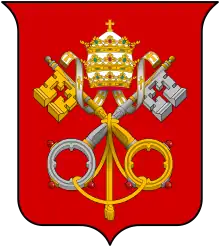Congregation for Divine Worship and the Discipline of the Sacraments
The Congregation for Divine Worship and the Discipline of the Sacraments (Latin: Congregatio de Cultu Divino et Disciplina Sacramentorum) is the congregation of the Roman Curia that handles most affairs relating to liturgical practices of the Latin Church as distinct from the Eastern Catholic Churches and also some technical matters relating to the Sacraments. Its functions were originally exercised by the Sacred Congregation of Rites, set up in January 1588 by Pope Sixtus V.
| Part of a series on the |
| Roman Curia |
|---|
 |
|
|
Current Superiors
- Prefect: Cardinal Robert Sarah
- Secretary: Archbishop Arthur Roche
- Undersecretary: Rev. Corrado Maggioni
History
The congregation is the direct successor of the Sacred Congregation for the Discipline of the Sacraments (Sacra Congregatio de Disciplina Sacramentorum) (1908–1969).
In 1975 it was given the title "Sacred Congregation for the Sacraments and Divine Worship" (Congregatio de Sacramentis et Cultu Divino) and incorporated the functions of the Sacred Congregation for Divine Worship (Sacra Congregatio pro Cultu Divino) which had been created in 1969 to take on responsibility for the liturgical affairs previously handled by the Sacred Congregation of Rites (Sacra Rituum Congregatio) (1588–1969).
Between 1984 and 1988 it was briefly redivided into the Congregation for the Sacraments (Congregatio de Sacramentis) and the Congregation for Divine Worship (Congregatio de Cultu Divino) under a single Prefect.
Responsibilities
The apostolic constitution Pastor bonus, issued by Pope John Paul II on 28 June 1988, established the congregation's functions:
- Regulation and promotion of the liturgy, primarily of the sacraments
- Regulation of the administration of the sacraments, especially regarding their valid and licit celebration
- Promoting liturgical pastoral activity, especially regarding the celebration of the Eucharist
- Drawing up and revision of liturgical texts
- Reviewing particular calendars and proper texts for the Mass and the Divine Office
- Granting the recognitio to translations of liturgical books and their adaptations
- Promoting the liturgical apostolate or sacred music, song or art
- Ensuring that liturgical norms are accurately observed, and that abuses are avoided and eliminated where they are found to exist.
- Examining the fact of non-consummation in a marriage and the existence of a just cause for granting a dispensation.
- Examining cases concerning the nullity of ordination.
- Regulating the cult of relics, the confirmation of heavenly patrons in diocese or locality
- The valid authorisation of Canonical Coronations for venerated Catholic images decreed from a Pope
- The elevation of sanctuaries to the title of Minor Basilica.
- Giving assistance to bishops so that the prayers and pious exercises of the Christian people may be fostered and held in high esteem
On 30 August 2011, Pope Benedict XVI transferred jurisdiction over unconsummated marriages and the nullification of ordinations to the Roman Rota to relieve the Congregation of administrative burdens and allow it to focus on liturgy, its principal responsibility.[1][2] In 2012, the Congregation added an office devoted to liturgical architecture and music.[3]
On 9 September 2017, Pope Francis weakened the congregation's authority with his motu proprio titled Magnum principium,[4] ensuring that, starting 1 October 2017,[4] the nation's Conference of Bishops will manage local liturgical translations.[5][4] Since 2001, the Congregation had greater authority over a nation's liturgical translations.[4] On October 22, 2017, the Vatican released a letter that Pope Francis had sent to the Prefect of the Congregation for Divine Worship and the Discipline of the Sacrament, Cardinal Robert Sarah, clarifying that the Vatican and its departments would have limited authority to confirm liturgical translations recognized by a local Conference of Bishops,[6] thus retracting a commentary which Sarah had published on 13 October 2017.[7]
Cardinal Prefects
- Domenico Ferrata (1908–1914)
- Filippo Giustini (1914–1920)
- Michele Lega (1920–1935)
- Domenico Jorio (1935–1954)
- Benedetto Aloisi Masella (1954–1968)
- Francesco Carpino (7 April 1967 – 26 June 1967)
- Francis James Brennan (1968)
- Antonio Samorè (prefect, Divine Worship, 1968–1969; prefect, Discipline of the Sacraments, 1968–1974)
- Benno Walter Gut (1969–1970)
- Arturo Tabera (1971–1973)
- James Knox (1974–1981)
- Giuseppe Casoria, (pro-prefect 1981–1983, prefect 1983–1984)
- Paul Mayer (pro-prefect 1984–1985, prefect 1985–1988)
- Eduardo Martínez Somalo (1988–1992)
- Antonio María Javierre Ortas (1992–1996)
- Jorge Arturo Medina Estévez (pro-prefect 1996–1998, prefect 1998–2002)
- Francis Arinze (2002–2008)
- Antonio Cañizares Llovera (2008–2014)
- Robert Sarah (2014–)
Secretary
- Annibale Bugnini, C.M. (1969–1975)
- Geraldo Majella Agnelo (1991–1999)
- Francesco Pio Tamburrino, O.S.B. (1999–2003)
- Domenico Sorrentino (2003–2005)
- Malcolm Ranjith (2005–2009)
- Joseph Augustine Di Noia (2009–2012)
- Arthur Roche (2012–)
Vox Clara Committee
In 2001 the Congregation established the Vox Clara Committee, composed of senior bishops from episcopal conferences throughout the English-speaking world. It advises the Congregation on English-language liturgical texts and their distribution. It meets in Rome.[8]
See also
- Magnum principium
- Musicam sacram
- Notitiae, the congregation's official journal
- Redemptionis sacramentum
References
- "Apostolic Letter: Quaerit Semper". Holy See. 30 August 2011. Retrieved 12 January 2017.
- Tornielli, Andrea (14 November 2012). "Congregation of Divine Worship undergoes reform". La Stampa. Retrieved 12 January 2017.
- Wooden, Cindy (14 November 2012). "Vatican congregation sets up office for art, architecture, music". The Catholic Register. Catholic News Service. Archived from the original on 13 January 2017. Retrieved 12 January 2016.
- https://www.nytimes.com/2017/09/09/world/europe/pope-francis-liturgical-reform.html?mcubz=3
- https://press.vatican.va/content/salastampa/en/bollettino/pubblico/2017/09/09/170909a.html
- http://www.thecatholictelegraph.com/in-letter-to-cardinal-sarah-pope-clarifies-new-translation-norms/45928
- http://www.ncregister.com/daily-news/cardinal-sarah-confirms-vatican-retains-last-word-on-translations
- Wooden, Cindy (8 February 2011). "Vox Clara, advising Vatican on English liturgy texts, gets new members". Catholic News Service (archived). Retrieved 22 August 2020.